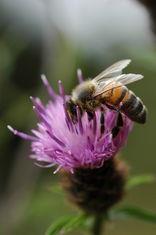
New money for research to halt honey-bee killer Varroa mites has led to a breakthrough for scientists in Scotland.
The major investment from public and private sector organisations is helping researchers from the University of Aberdeen and the national bee unit of the Food & Environment Research Agency (FERA) to develop completely new ways of tackling the destructive blood-sucking mites.
The researchers have worked out how to “knock down” genes in the parasitic mite causing it to die.
So far the work has only been done in a laboratory but now the scientists can take their work a step closer towards developing a product that could help beekeepers and the wider horticulture industry that relies on bees for crop pollination thanks to funding worth more than £250,000 from the Biotechnology & Biological Sciences Research Council (BBSRC) and Vita (Europe) Ltd.
Dr Alan Bowman, who is heading up the research, said: “Honey bees are incredibly important because of their pollination of flowers of both wild and farmed plants.
“But their numbers are seriously declining year on year and while there are probably several reasons for this, one of the most important factors is Varroa destructor that sucks the blood from bees and transmits serious viral diseases.
“There is an urgent need to develop a Varroa-specific, environmentally friendly treatment or some method of overcoming Varroa’s resistance mechanism to existing treatments and that’s what we are now working towards.”
Max Watkins, technical director of Vita (Europe) Ltd, a major funder of the research, said: “Finding treatments that kill Varroa mites, but don't harm honeybees, bee products or the environment is not easy. The challenge is heightened because the relatively short life cycle of the Varroa mite means that resistance to a single treatment can often develop quite quickly unless beekeepers alternate treatments of different types. Vita is therefore supporting this exciting and innovative research and hopes that an effective and environmentally sensitive treatment can eventually be developed at a cost that is affordable to beekeepers across the globe."
Dr Giles Budge, from the FERA’s bee unit said: “We are delighted to be in a position to progress this research, playing our part facilitating the translation of science from brilliant academics at Aberdeen to a company like Vita which has an established record of research, development and marketing of new honey bee health products. It is particularly exciting to see our work move from the bench into products which could become commercially available to help beekeepers.”
Researchers will create and scour databases of all the varroa genes in a bid to identify the ones that can be effectively and safely targeted by potential new treatments.
Dr Bowman added: “We rely on honey bees to pollinate our crops and add variety to our diets, which is why there is a real need to tackle the problem of their decline. Having proved our concept in the lab we are delighted that this funding will allow us to develop our research to have real-world impact.”



